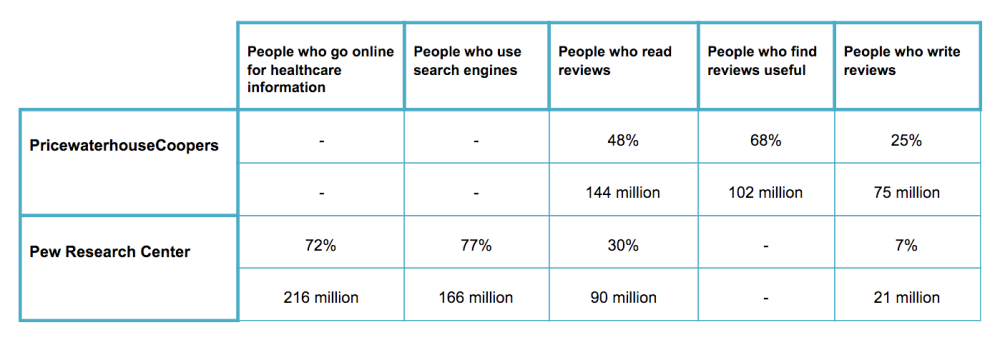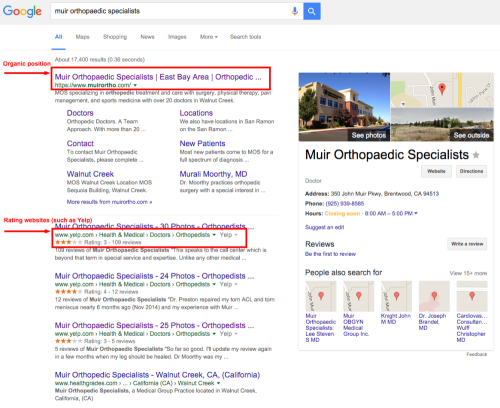Online reputation management, or ORM, is the act of influencing public perceptions that have been created on a third party website. Third party sites like Yelp, Healthgrades, Vitals and RateMDs are community boards where anyone can post a review and anyone can read that review. ORM attempts to control how the public views your business on these sites.
The number of people who use the Internet for researching and reviewing physicians is much higher than you might think. Two organizations looked at how Americans find healthcare services and how they review those services:

Regardless of which firm’s numbers are correct, there are clearly many people reading reviews. When a patient searches for a practice using a search engine, he or she typically sees the practice first in an organic (non-paid) position. Following that is a list of rating websites, such as Yelp and RateMDs, which have reviews for the practice and, often, some of the physicians. This makes a powerful first impression (see below).

It is important to note that many companies sell a “magic elixir” of ORM. This “elixir” is really monitoring software that, while sometimes helpful for large corporations and hospitals, is not as useful for smaller practices. Get rid of the notion that all you need is some fancy software to fix your ORM woes. The best way is to take control of your online reputation so that you can be the one influencing the public. After all, the patient, like a customer, has a voice and a choice.
How to handle a bad review
First, many online reviews are considered by physicians to be unfair or untrue. Your practice is always going to get reviews, and you are bound to get some negative ones. So what do you do when you have received a particularly nasty comment?
Let’s start with what not to do, which is to fight back. The Santa Clara University School of Law published a compilation of cases where physicians sued their patients over online reviews, and it shows that those cases are routinely thrown out, or settled out, of court. More often than not, the court tends to favor free speech.
It is impossible to prevent all dissatisfied patients from rating and reviewing their physicians, so your only option is to read the comments and see what their complaints are. And much of the time complaints are about bad attitude.
Vanguard Communications did just that by conducting an independent study looking at critical reviews of physicians. We gathered 3,617 reviews at practices located in four U.S. cities (Denver, San Diego, New York, Austin) from three separate reviewing websites (Vitals, RateMDs and Yelp). We found that out of all of the physicians, only about 12 percent of them were actually rated at less than three stars. We also found that most of the reviews cited:
- Physician indifference (43 percent)
- Poor bedside manner and bad customer service (36 percent)
- An intention to not go back to that physician (19 percent)
A healthy practice culture prevents negative reviews
So how do you stop the negative reviews and promote the positive ones? We can see from our study that patients typically are not complaining about the medical care; they just want the environment of the practice to change. To fix that problem, it is important to create a practice culture that is watchful, responsive and preventive.
- Watchful staff members are trained to give patients their full attention and to use active listening. They also will know when a situation is escalating and should be taken to upper management.
- Responsive staffers know what they should say to a patient in any given situation. They will have deadlines for returning phone calls and emails and they will possess the skills to de-escalate tension.
- Preventive staff is warm and kind to everyone who calls or enters the office. They habitually ask, “Is there anything else I can help you with?” They minimize internal chitchat and they avoid making excuses.
Other ways to create a healthy practice culture are to have a live human answering the phone, apologizing for delays (because we know they happen), dressing professionally and always following up.
All of this can help prevent a negative review while creating a practice where people feel welcome and cared for. However, things slip through the cracks and sometimes you just cannot prevent a situation where a patient is unhappy. What then? Here at Vanguard we advise a three-step process:
- Deal with complaints privately: You want to try to take care of a patient’s complaints and control the situation before he or she goes online and it becomes public.
- Respond quickly and politely: Once the complaint goes public, craft a response that sounds caring and genuine (no matter how much it hurts), and try to reach out and resolve the issue. Yelp allows businesses to respond to reviews privately, which could influence the writer to remove his or her negative review.
- Encourage online praise: One bad review is not going to matter if you are getting all of your happy patients to review you as well. Encourage reviews from satisfied patients by providing information about accessing review sites in your waiting room or links to them on your website.
Visit Vanguard Communications to learn more
Interested in learning more about online reputation management? Vanguard’s medical marketing blog is a comprehensive resource written by the industry’s most experienced marketing specialists.